Content Managers are at the heart of a successful digital marketing strategy. They ensure that content aligns with the company's brand and meets the audience's needs, playing a key role in engaging customers and driving traffic.
The role requires a mix of skills including strong writing and editing abilities, understanding of SEO principles, and proficiency in content management systems. Additionally, effective communication and project management are crucial for coordinating with different teams and managing content schedules.
Candidates can write these abilities in their resumes, but you can’t verify them without on-the-job Content Manager skill tests.
In this post, we will explore 9 essential Content Manager skills, 11 secondary skills and how to assess them so you can make informed hiring decisions.
Table of contents
9 fundamental Content Manager skills and traits
The best skills for Content Managers include Content Strategy, SEO Knowledge, Content Creation, Analytics, Project Management, Editing and Proofreading, Social Media Management, CMS Proficiency and Audience Research.
Let’s dive into the details by examining the 9 essential skills of a Content Manager.
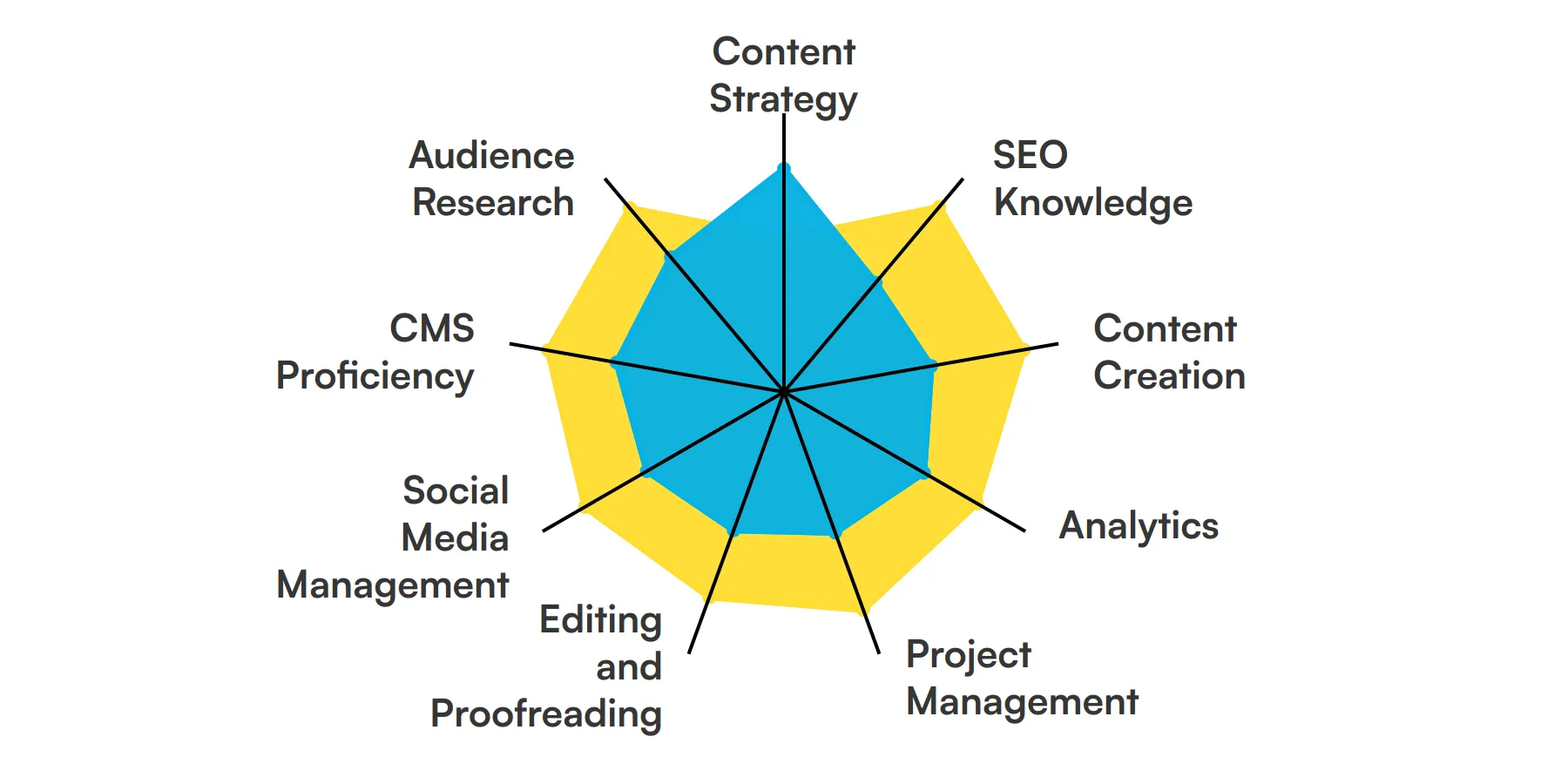
Content Strategy
A content manager needs to develop and implement a comprehensive content strategy that aligns with the company's goals. This involves planning, creating, and managing content across various platforms to ensure consistency and engagement.
For more insights, check out our guide to writing a Content Strategist Job Description.
SEO Knowledge
Understanding search engine optimization is crucial for a content manager. This skill helps in optimizing content to rank higher on search engines, driving more organic traffic to the website.
Content Creation
Creating high-quality, engaging content is at the heart of a content manager's role. This includes writing blog posts, creating videos, and designing infographics that resonate with the target audience.
Check out our guide for a comprehensive list of interview questions.
Analytics
A content manager must be adept at using analytics tools to measure the performance of content. This helps in understanding what works and what doesn't, allowing for data-driven decisions to improve content strategy.
Project Management
Managing multiple content projects simultaneously requires strong project management skills. This includes setting deadlines, coordinating with team members, and ensuring that all content is delivered on time.
For more insights, check out our guide to writing a Project Manager Job Description.
Editing and Proofreading
Attention to detail is key for a content manager. Editing and proofreading skills ensure that all content is free of errors and maintains a high standard of quality.
Social Media Management
A content manager should be proficient in managing social media platforms. This involves scheduling posts, engaging with the audience, and analyzing social media metrics to improve performance.
Check out our guide for a comprehensive list of interview questions.
CMS Proficiency
Being proficient in content management systems (CMS) like WordPress or Drupal is essential. This skill allows a content manager to efficiently publish and manage content on the website.
Audience Research
Understanding the target audience is crucial for creating relevant content. A content manager should be skilled in conducting audience research to tailor content that meets the audience's needs and preferences.
11 secondary Content Manager skills and traits
The best skills for Content Managers include Graphic Design, Email Marketing, Video Production, HTML/CSS, Copywriting, Public Relations, Customer Service, Time Management, Networking, Adaptability and Budget Management.
Let’s dive into the details by examining the 11 secondary skills of a Content Manager.
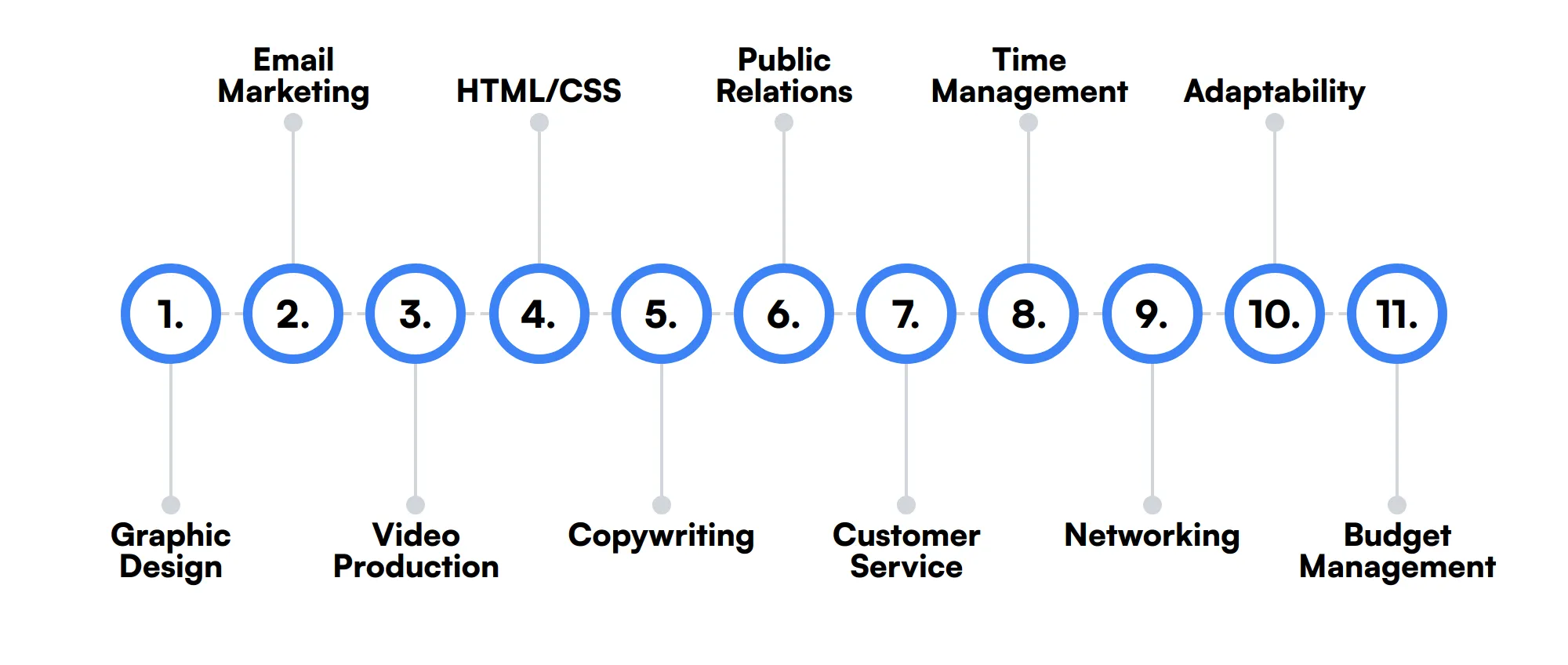
Graphic Design
Basic graphic design skills can be beneficial for a content manager. This allows for the creation of visually appealing content without always relying on a designer.
Email Marketing
Knowledge of email marketing can help a content manager in creating effective email campaigns. This includes writing compelling copy and analyzing email performance metrics.
Video Production
Understanding the basics of video production can be a plus. This skill helps in creating engaging video content that can be shared across various platforms.
HTML/CSS
Basic knowledge of HTML and CSS can be useful for a content manager. This allows for minor tweaks and customizations on the website without needing a developer.
Copywriting
Strong copywriting skills can enhance the effectiveness of content. This involves writing persuasive and compelling copy that drives action from the audience.
Public Relations
Understanding public relations can help a content manager in managing the company's image. This includes writing press releases and handling media inquiries.
Customer Service
Having a background in customer service can be beneficial. This skill helps in understanding customer needs and creating content that addresses their pain points.
Time Management
Effective time management is crucial for handling multiple tasks and deadlines. This skill ensures that all content projects are completed on schedule.
Networking
Building relationships with industry influencers and other content creators can be advantageous. Networking helps in expanding the reach and impact of the content.
Adaptability
The digital landscape is constantly changing. A content manager should be adaptable and open to learning new tools and techniques to stay ahead.
Budget Management
Managing the content budget effectively ensures that resources are allocated wisely. This skill helps in maximizing the impact of content within the available budget.
How to assess Content Manager skills and traits
Assessing the skills and traits of a Content Manager involves more than just glancing at their resume. It's about understanding how well they can strategize, create, and manage content that resonates with your audience. A comprehensive evaluation requires a deep dive into their practical abilities across various domains such as SEO, analytics, and social media management.
Traditional hiring methods often fall short in accurately gauging these competencies. This is where skills assessments come into play, offering a structured approach to evaluate potential candidates. By using tools like Adaface assessments, you can ensure that you're not just filling a position, but are hiring a candidate who will genuinely add value to your team. Adaface assessments are designed to measure a range of skills from content strategy to CMS proficiency, helping you achieve a 2x improvement in the quality of your hires. For more details, visit Adaface Content Manager Skill Tests.
In today’s digital age, a Content Manager must also be adept at audience research and project management. These skills ensure that the content not only reaches the target audience but also engages them effectively. Therefore, assessing these skills thoroughly will equip you with a clear picture of the candidate’s potential impact on your organization.
Let’s look at how to assess Content Manager skills with these 6 talent assessments.
Content Strategy Test
Our Content Strategy Test evaluates candidates' knowledge and skills in developing effective content strategies for digital platforms.
The test assesses their abilities in areas such as audience analysis, content planning, information architecture, and user experience optimization. It includes questions on understanding and defining target audience, content auditing, content gap analysis, and developing a content strategy.
Successful candidates demonstrate a strong grasp of keyword research and SEO, content creation, and content performance measurement. They also show proficiency in multichannel content strategy and crisis communication.
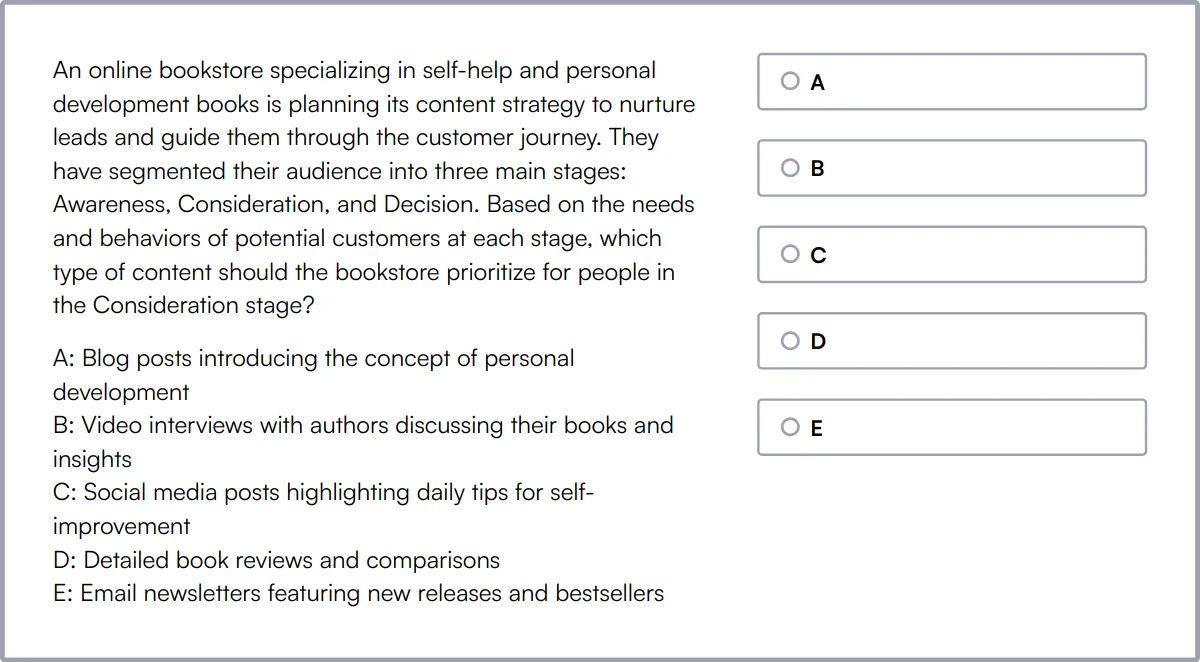
PPC Assessment Test
Our PPC Assessment Test uses scenario-based multiple choice questions to evaluate candidates on their understanding of pay-per-click advertising concepts and strategies.
The test covers keyword research, ad copywriting, bid management, landing page optimization, and conversion tracking. It also assesses their skills in campaign optimization, budget management, and analytics and reporting.
High-scoring candidates show proficiency in Google AdWords, market analysis, and online advertising. They can effectively manage PPC campaigns and drive targeted traffic.
Copywriting Skills Test
Our Copywriting Skills Test focuses on evaluating candidates' grammar, vocabulary, reading comprehension, and their command over the English language.
The test assesses skills in headline writing, subheading creation, SEO writing, and call to action (CTA) creation. It also evaluates their ability to edit and proofread, write for different formats and mediums, and understand brand voice and tone.
Successful candidates demonstrate strong attention to detail, verbal reasoning, and writing for accessibility. They can effectively target audiences and measure copy performance.
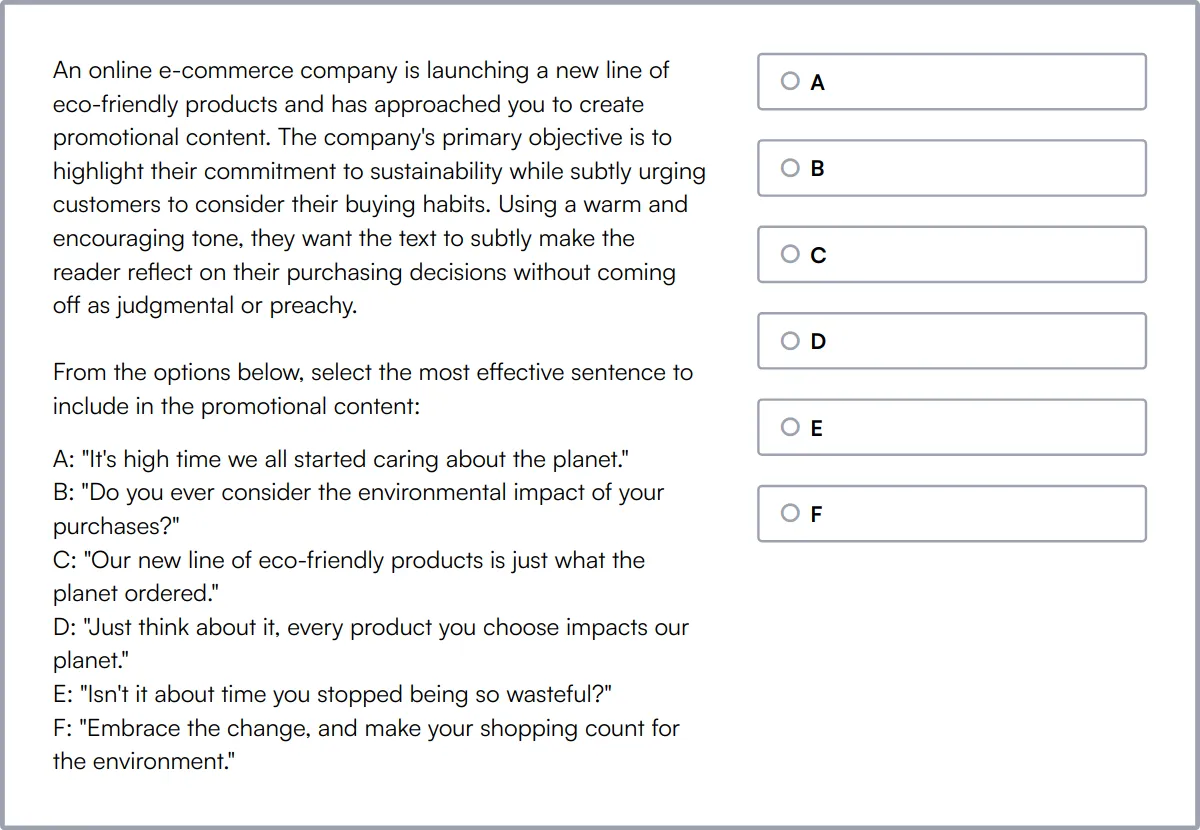
Google Analytics Test
Our Google Analytics Test assesses a candidate's ability to use the Google Analytics platform to make data-driven decisions.
The test covers setting up Google Analytics, creating and customizing reports, tracking website traffic, and analyzing user behavior. It also evaluates their skills in setting up goals and conversions, implementing e-commerce tracking, and using Google Analytics for marketing campaigns.
Candidates who perform well demonstrate proficiency in advanced analytics techniques, Google Analytics API, and Google Tag Manager integration.
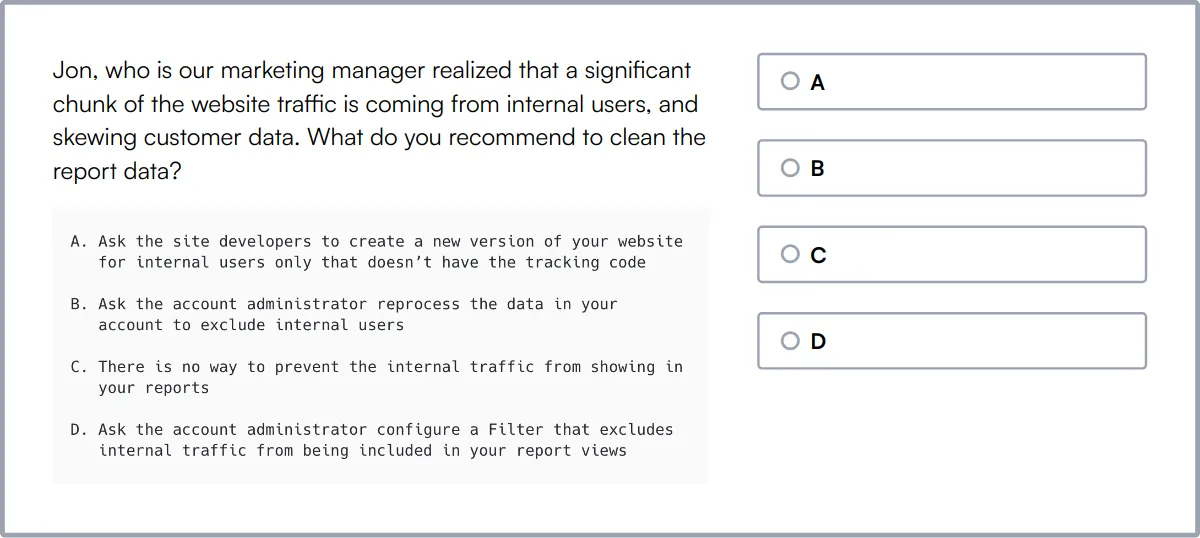
Project Management Test
Our Project Management Test assesses a candidate's ability to plan projects from conception to implementation.
The test evaluates skills in cost and budget estimation, situational judgement, designing a project plan, and resolving issues and handling changes. It also covers managing and controlling resources, stakeholder management, and prioritizing tasks in real-time.
Successful candidates show proficiency in agile project management and Scrum, traditional (waterfall) project management, and risk analysis. They can effectively create and analyze project reports.
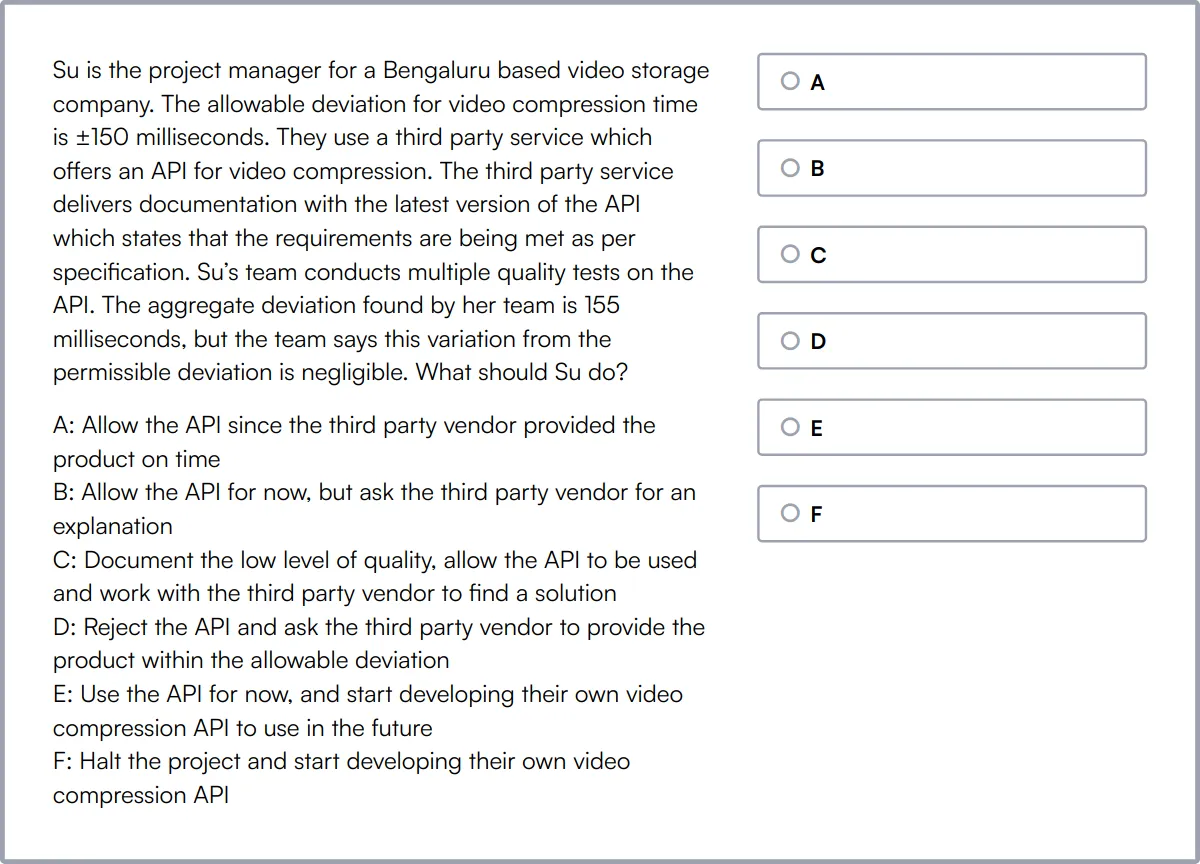
English Comprehension Test
Our English Comprehension Test evaluates a candidate’s ability to comprehend business-level English and express ideas clearly.
The test covers drawing conclusions, inferencing, attention to detail, grammar, and vocabulary. It also assesses skills in reading comprehension, sentence structure, and writing skills.
Candidates who perform well demonstrate strong listening comprehension and the ability to deduce information from presented facts.
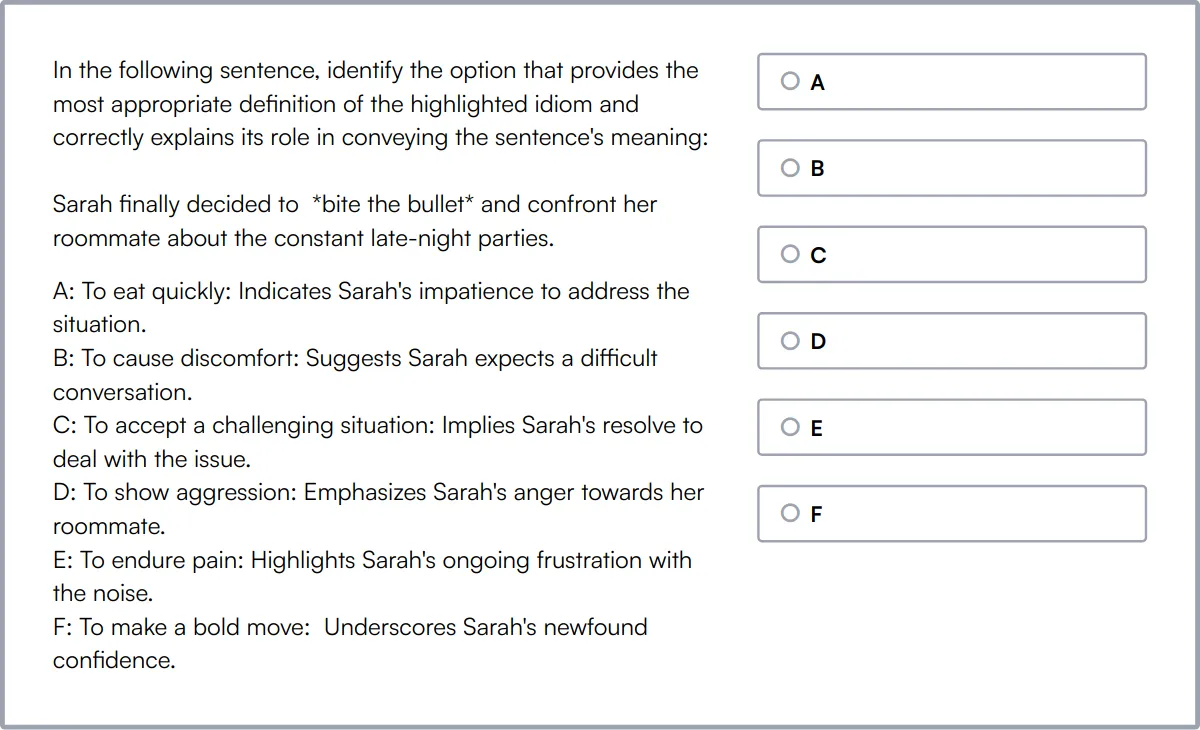
Summary: The 9 key Content Manager skills and how to test for them
| Content Manager skill | How to assess them |
|---|---|
| 1. Content Strategy | Evaluate the ability to plan and execute a comprehensive content roadmap. |
| 2. SEO Knowledge | Assess understanding of optimizing content for search engines to drive traffic. |
| 3. Content Creation | Review the quality and creativity of written, visual, or multimedia content. |
| 4. Analytics | Check proficiency in using data to measure and improve content performance. |
| 5. Project Management | Determine capability to manage timelines, resources, and team coordination. |
| 6. Editing and Proofreading | Evaluate attention to detail and accuracy in refining content. |
| 7. Social Media Management | Assess skills in managing and growing social media presence. |
| 8. CMS Proficiency | Check familiarity with content management systems for publishing and organizing content. |
| 9. Audience Research | Evaluate ability to understand and target specific audience demographics. |
Content Strategy Test
Content Manager skills FAQs
What is the importance of content strategy in a Content Manager role?
Content strategy helps align content with business goals, ensuring consistency and relevance. It involves planning, development, and management of content.
How can SEO knowledge be assessed in a Content Manager candidate?
Ask candidates about their experience with keyword research, on-page SEO, and their familiarity with tools like Google Analytics and SEMrush.
What are key indicators of strong content creation skills?
Look for a portfolio showcasing diverse content types, creativity, and the ability to engage the target audience.
Why is analytics important for a Content Manager?
Analytics help measure content performance, understand audience behavior, and guide data-driven decisions to improve content strategy.
How can project management skills be evaluated?
Inquire about their experience with project management tools like Trello or Asana, and their ability to manage timelines and coordinate with teams.
What should you look for in a candidate's editing and proofreading skills?
Assess their attention to detail, grammar, and ability to maintain a consistent tone and style across content.
How does social media management fit into a Content Manager's role?
It involves planning and executing social media strategies, engaging with the audience, and analyzing social media metrics.
What is CMS proficiency and why is it important?
CMS proficiency means being skilled in using content management systems like WordPress or Drupal, which is essential for managing and publishing content efficiently.

40 min skill tests.
No trick questions.
Accurate shortlisting.
We make it easy for you to find the best candidates in your pipeline with a 40 min skills test.
Try for freeRelated posts
Free resources



